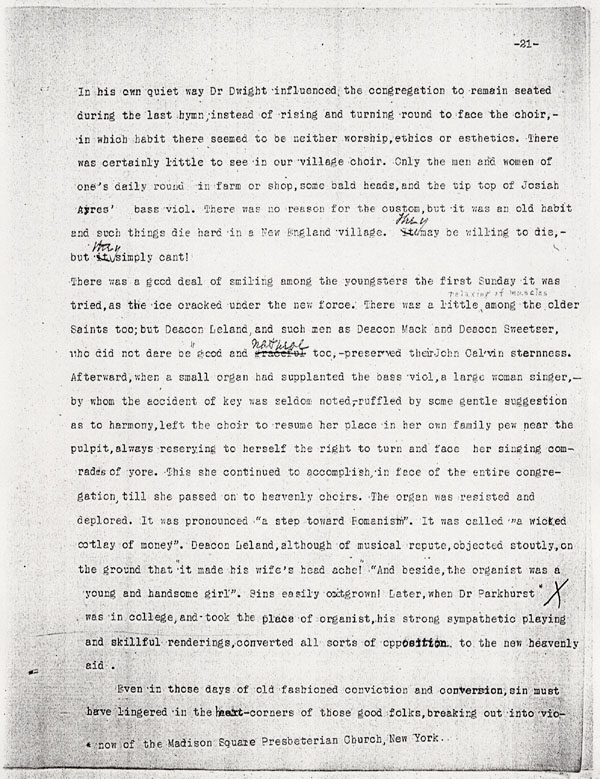
-----------------------------------------------------------------------------------------------------------------------------------
-21-
In his own quiet way Dr Dwight influenced the congregation to remain seated
during the last hymn, instead of rising and turning round to face the choir, --
in which habit there seemed to be neither worship, ethics or esthetics. There
was certainly little to see in our village choir. Only the men and women of
one's daily round in farm or shop, some bald heads, and the tip top of Josiah
Ayres' bass viol. There was no reason for the custom, but it was an old habit
and such things die hard in a New England village. It They may be willing to die, --
but it they simply cant!
There was a good deal of smiling among the youngsters the first Sunday it was
tried, as the ice cracked under the new force. There was a little relaxing of muscles among the older
Saints too; but Deacon Leland, and such men as Deacon Mack and Deacon Sweetser,
who did not dare be "good and graceful natural too, -- preserved their John Calvin sternness.
Afterward, when a small organ had supplanted the bass viol, a large woman singer, --
by whom the accident of key was seldom noted, -- ruffled by some gentle suggestion
as to harmony, left the choir to resume her place in her own family pew near the
pulpit, always reserving to herself the right to turn and face her singing com-
rades of yore. This she continued to accomplish, in face of the entire congre-
gation, till she passed on to heavenly choirs. The organ was resisted and
deplored. It was pronounced "a step toward Romanism". It was called "a wicked
cotlay of money". Deacon Leland, although of musical repute, objected stoutly, on
the ground that "it made his wife's head ache!" "And beside, the organist was a
young and handsome girl". Sins easily outgrown! Later, when Dr Parkhurst * X
was in college, and took the place of organist, his strong sympathetic playing
and skillful renderings, converted all sorts of opposition to the new heavenly
aid.
Even in those days of old fashioned conviction and conversion, sin must
have lingered in the heart-corners of those good folks, breaking out into vio-
* now of the Madison Square Presbeterian [sic] Church, New York.



